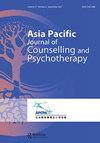‘Oh, it is a special gift you give to me … ’: a phenomenological analysis of counsellors in Cambodia
IF 0.5
4区 心理学
Q4 PSYCHOLOGY, CLINICAL
Asia Pacific Journal of Counselling and Psychotherapy
Pub Date : 2019-06-10
DOI:10.1080/21507686.2019.1629470
引用次数: 1
Abstract
ABSTRACT Research on mental health in Cambodia is increasing, yet there is limited focus on experiences of counsellors within this developing profession. This paper reports an Interpretative Phenomenological Analysis conducted with thirteen practicing counsellors in Cambodia. Our specific interest was to gain an idiographic understanding of the meanings participants made of the changes they experienced in becoming counsellors, while also considering the unique context of Cambodia. Our findings are presented through an integration of description and interpretation, which grounds our participants’ experiences of change, tension, and meaning-making in the socio-historical context of Cambodia and mental health development. Implications recommend ways to improve support needed to assist counsellors in this developing field.“哦,这是你给我的特别礼物……”:对柬埔寨咨询师的现象学分析
摘要:柬埔寨对心理健康的研究正在增加,但对咨询师在这一发展中的职业中的经验关注有限。本文对柬埔寨13名执业辅导员进行了解释现象学分析。我们的具体兴趣是具体了解参与者在成为顾问过程中所经历的变化的含义,同时考虑柬埔寨的独特背景。我们的研究结果是通过描述和解释的结合呈现的,这为我们的参与者在柬埔寨和心理健康发展的社会历史背景下的变化、紧张和意义创造的经历奠定了基础。影响建议如何改进对这一发展中领域辅导员的协助所需的支持。
本文章由计算机程序翻译,如有差异,请以英文原文为准。
求助全文
约1分钟内获得全文
求助全文

 求助内容:
求助内容: 应助结果提醒方式:
应助结果提醒方式:


